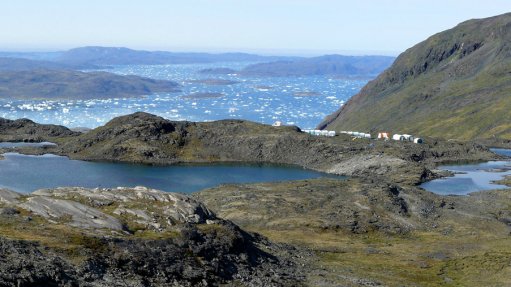
PERTH (miningweekly.com) – ASX-listed Greenland Minerals (GGG) has appointed Daniel Mamadou as MD to start a strategic review of its assets, after the Greenland government in November banned uranium mining, impacting GGG’s Kvanefjeld rare earths project.
The company on Monday said that it would "broaden its project portfolio and is seeking new opportunities" in related technology minerals and metals sectors to create shareholder value, leveraging off its strong cash position of A$31.6-million at the end of September.
Mamadou, in his new role as MD, will drive the next phase of GGG’s growth and development, following the resignation of Dr John Mair from the role. Mair will work in an advisory capacity with Mamadou, who is based in Singapore, to transition the company effectively.
“We thank Mair for his tireless efforts to advance the Kvanefjeld project during his seven years as MD. Thanks to his focus, GGG has advanced the project to pre-development status, and has the potential to be a globally significant producer of neodymium, praseodymium, terbium, and dysprosium going forward,” said GGG chairperson Tony Ho.
“We are also pleased to welcome Mamadou to the board and look forward to his strategic review of GGG’s operations and growth options.”
Mamadou is the founder of Welsbach Holdings, a Singapore-based company which specialises in the financing and development of technology metals supply chains. He founded and was MD of Talaxis, Noble Group’s technology metals division in Hong Kong, from 2015 until 2020. During this period, he drove the development of technology metals supply chains, gaining expertise across rare earths, lithium, cobalt, and graphite along with a range of other critical materials. He is also a nonexecutive director of TSX-listed Medallion Minerals.
GGG was left floundering in November after the Greenland government passed legislation banning uranium mining in the region, making development of the Kvanefjeld project difficult.
GGG had previously noted that while the uranium was not of great economic significance to the Kvanefjeld project, the revenues generated by the uranium and other by-products would serve to reduce the rare earth production costs.
The company has been communicating with the Greenland government regarding the Kvanefjeld Impact Benefit Agreement, the remaining requirement to complete the formal exploitation licence application.
The company said on Monday that it is also reviewing legislation recently passed by Greenland’s Parliament that places an upper limit on the uranium content of mineral resources that can be exploited, and how this legislation will impact the Kvanefjeld project.
GGG will update on the next steps for Kvanefjeld as soon as is practicable.
The miner told shareholders that until there is clarity from the legislation and the impact on forward timelines, and in consideration that the independent assessments, majority of studies and work programs that underpin the Kvanefjeld project are completed, the board believes that it is prudent and timely to seek new opportunities outside of Greenland to which the company can leverage value in the near term.
“The global energy transition requires the creation of additional supply chains for critical minerals,” Mamadou said.
“This requires financial and human capital to be deployed on projects that have the potential to address the looming shortages in the supply chains of technology metals. Having a strong cash position, GGG is well-positioned to play its role as one of the emerging key players in this space. The team at GGG has worked tirelessly to advance the Kvanefjeld project and boasts an intimate understanding of the challenges associated with bringing new supplies of rare earths into production. I look forward to working with the team to re-evaluate the company’s strategic options and to chart its course going forward.”